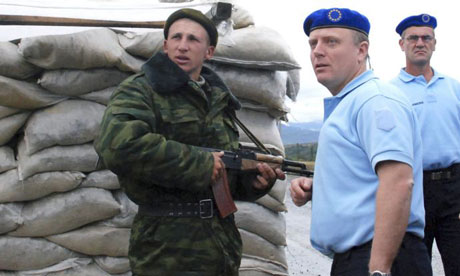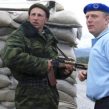
Russia Adjusting Regime Change Policy in Georgia
Publication: Eurasia Daily Monitor Volume: 7 Issue: 7
By:

Reversing Carl Von Clausewitz’s dictum, Russia’s emergent policy toward Georgia is essentially a continuation of war by political means. Russia’s 2008 war and three-year economic blockade sought to change Georgia’s Western orientation through regime change in Tbilisi. By the end of 2009, however, Moscow evidently concluded that war and blockade had failed to achieve that goal.
With EU monitors on the ground, Russia has lost the option of orchestrating clashes to justify an attack into Georgia’s interior. The Georgian radical opposition, while still able to wreak havoc on Tbilisi, has proven too inept to achieve Russia’s best-case scenario of regime change through Georgian hands. Although Russia’s economic blockade has aggravated the global recession’s impact on Georgia, the government has coped effectively and the country is set to recover from a 4 percent GDP decline in 2009 to an anticipated 2 percent growth in 2010. Meanwhile, Russia’s military occupation and diplomatic “recognition” of Abkhazia and South Ossetia (to the accompaniment of ethnic cleansing) has deprived Moscow of any real levers for influencing Georgia’s foreign policies and domestic politics.
As a net result, Russia has conquered two Georgian territories militarily, while alienating Georgia politically and losing it strategically. At this point, Russia has rendered itself irrelevant to Georgia in almost every way except through hostility and nuisance value. This is the operative meaning of Georgian Minister of Foreign Affairs Grigol Vashadze’s statement at last year’s end: Georgia’s strategy is to “forget about Russia, concentrate on developing strong ties with the EU and NATO. The less Russia we have, the better” (Civil Georgia, December 1).
Recognizing its political failure, Moscow is now embarking on a policy of regime change through different means. These include: gradually lifting the economic blockade, as a prerequisite to reaching out to the Georgian people; using the Orthodox Church as an avenue for such outreach; selecting and promoting a mainstream opposition figure (currently Zurab Nogaideli) as Russia’s favorite in Georgia; and allowing vague hints at a possible reintegration of Georgia under Russian auspices. In its own discourse, the Kremlin more heavily emphasizes a black-and-white, wedge-drawing contrast between Georgian authorities and the Georgian people. Moscow acts as if it does not recognize President Mikheil Saakashvili and his government.
On December 9, President Dmitry Medvedev told journalists that Russia would be willing to restore direct flights between Georgia and Russia, re-open the one legally functioning highway between the two countries, and allow Georgian products again on the Russian market, all this in short order; and later to negotiate toward visa-free travel arrangements. He did not mention any pre-conditions to such steps by Russia.
However, Medvedev rejected the idea of resuming contacts with Saakashvili or other senior Georgian officials due to “the crime that was committed” [in August 2008]. “Our paths have diverged too far and our views are too far apart…But this does not mean that we must freeze all other relations [with Georgians]. Our peoples have a centuries-old friendship, a special history” (Interfax, December 9).
Medvedev’s statement has set the tone for the adjustment of the regime-change policy. Top Russian officials have spoken since then in a similar tenor. It implies resuming and conducting economic and people-to-people relations outside an inter-state framework, and in the absence of diplomatic relations. It tells Georgia’s irreconcilable opposition that Moscow’s own differences with the Georgian government are also irreconcilable. And it maintains the pretense of criminalizing Georgia’s legitimate leadership to justify the pursuit of regime change in Tbilisi.
The Georgian government has welcomed Russia’s declared willingness to lift the blockade and reactivate economic relations. Tbilisi, however, wants all relations to be conducted in a legal inter-state framework. With bilateral diplomatic relations broken since the 2008 war, Russia and Georgia maintain interest sections in their Swiss embassies in Tbilisi and Moscow, respectively.
In late December, Moscow and Tbilisi announced that the highway between Georgia and Russia would soon re-open at the Kazbegi-Upper Larsi border checkpoint. This is the only highway connection between Georgia and Russia outside Abkhazia or South Ossetia and it can therefore be used legally for international traffic. Russia’s closure of this highway had punished not only Georgia but also Moscow’s ally Armenia, which had relied on the same highway for the shortest access to Russia via Georgian territory. Negotiations through Swiss good offices led to the decision to re-open that highway shortly (Interfax, December 24).
Announcing the decision, the Russian Foreign Minister Sergei Lavrov declared: “The Georgian people are a friendly people to us. We want authorities that meet the Georgian people’s interests to be established in Georgia” (Interfax, December 24). The statement suggests that Moscow feels entitled to make that determination.
On January 4, Russia’s consumer goods inspectorate announced that Moscow is willing to lift the embargo on Georgia’s Borjomi mineral water, a national prestige trademark. The Kremlin has used this inspectorate (RosPotrebNadzor) repeatedly to implement or lift economic sanctions on various countries by political criteria. The agency’s chief, Gennady Onishchenko, had earlier embargoed Borjomi. Now, however, the same Onishchenko publicly urges Tbilisi to discuss the technicalities of resuming Borjomi exports to Russia (Interfax, January 4).
On January 8, Georgian Airways (Airzena) was allowed to fly a charter plane to Moscow for the first time since Russia had closed the direct air traffic. Several more charter flights are scheduled from Tbilisi to Moscow and St. Petersburg during January. Deputy Prime Minister Sergei Ivanov oversaw the preparatory moves on the Russian side. Ivanov, who had urged attacking Georgia long before 2008 while defense minister, now says, “the problems of Georgia’s ordinary people should be treated separately from the problems we have with this state” (Interfax, December 23). The Duma’s international affairs committee chairman Konstantin Kosachev, a habitual assailer of Georgia, approves and soothingly predicts that “further steps should follow. There are no obstacles for the air traffic to be normalized” (Ekho Moskvy, January 4). Negotiations are in progress on regular flights to resume from February onward (Interfax, Rustavi-2 TV, January 8, 9).
Russia had imposed the sanctions in 2006. It closed all railroad, highway, air, and maritime links with Georgia, halted remittance transfers; and it embargoed Georgian wines, other agricultural products, and mineral water (all traditional exports to Russia). Moscow allowed airline flights again in March 2008, but stopped them in August of that year.
Moscow is now preparing to re-open lines of communication with Georgian society at the levels of business, politics, and various dimensions of “soft power.” The twin goals are rebuilding influence in the country and undercutting the government. Russia seems in a hurry to start dismantling its useless and counterproductive economic sanctions against Georgia. At the same time, it makes a show of refusing to recognize the country’s president and government.
There is no contradiction between removal of sanctions and demonstrative non-recognition of the authorities, whom Moscow continues to accuse of “war crimes.” This two-track policy seeks to re-connect Russia with parts of Georgian society and gain allies in the Georgian opposition. It aims to encourage another push for regime change through snap elections. It prepares to reward political allies with business opportunities. And it seeks to attract some mainstream political groups, not just marginals, to side openly with a more benign-looking Russia. The Kremlin undoubtedly expects Georgia’s upcoming municipal elections to re-energize the opposition’s demands for pre-term national elections.




